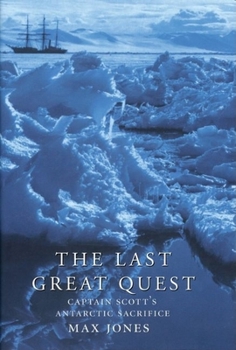The Last Great Quest: Captain Scott's Antarctic Sacrifice
Select Format
Select Condition 
Book Overview
Many have told the story of Sir Robert Scott's dramatic and, ultimately, tragic race to the South Pole. But in The Last Great Quest, Max Jones adds a new dimension to the story by probing the nature of heroism in modern Britain as reflected in the strengths and weaknesses of Scott himself. In particular, he charts the cultural reverberations of Scott's death and sacrifice on the eve of the greatest slaughter in British history--the First World War.
A dramatic opening leads to a compelling examination of the British traditions of exploration, the scientific ambitions of the expedition, the "race to the South Pole," and the disaster itself. Jones argues that Scott's death was a pivotal moment in British history, and central to this is his extraordinary journal--the ultimate expression of self-control and heroism in the face of death--which was immensely popular in the years before the war. This important and challenging interpretation of Scott's life and death re-evaluates the man and his sacrifice. Indeed, Jones shows that the story of Scott of the Antarctic is a key to understanding modern British history, connecting Scott with Dr. Livingstone, the Titanic disaster, and the ascent of Everest. In particular, Scott's story helps us to fathom the generation who fought and died in the Great War.
The most important new contribution to our knowledge of this compelling story in nearly 25 years, and the first account that sets the story in a wider historical context, The Last Great Quest brims with original conclusions that are based on previously unavailable evidence.
A dramatic opening leads to a compelling examination of the British traditions of exploration, the scientific ambitions of the expedition, the "race to the South Pole," and the disaster itself. Jones argues that Scott's death was a pivotal moment in British history, and central to this is his extraordinary journal--the ultimate expression of self-control and heroism in the face of death--which was immensely popular in the years before the war. This important and challenging interpretation of Scott's life and death re-evaluates the man and his sacrifice. Indeed, Jones shows that the story of Scott of the Antarctic is a key to understanding modern British history, connecting Scott with Dr. Livingstone, the Titanic disaster, and the ascent of Everest. In particular, Scott's story helps us to fathom the generation who fought and died in the Great War.
The most important new contribution to our knowledge of this compelling story in nearly 25 years, and the first account that sets the story in a wider historical context, The Last Great Quest brims with original conclusions that are based on previously unavailable evidence.
Format:Hardcover
Language:English
ISBN:0192804839
ISBN13:9780192804839
Release Date:November 2003
Publisher:Oxford University Press
Length:368 Pages
Weight:1.00 lbs.
Dimensions:1.4" x 6.3" x 9.7"
Customer Reviews
1 rating
An investiagtion of Scotts south pole expedition
Published by Thriftbooks.com User , 21 years ago
Scott reached the South Pole....and found a Norwegian flag planted on it. He had arrived just weeks late. The mechanical `beasts' he had brought with him, tread driven sledges, have broken down. Soon Scotts party is starving and unable to walk, and eventually they die, having reached the South Pole but not been able to return to their homeland. This book chronicles the disaster of Scotts expedition, the success and dramatic failures it encountered. The author then explores the hitherto unknown part of Scotts accomplishment: the aftermath. Such interesting aspects are looked at as the memorial designs for Scott and the many memorials in London's Newspapers. Also the author looks at the `imperialism' of Scotts enterprise and the way in which Scott and his `martyrdom' have been remembered. An interesting book, with much to offer.






